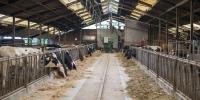Green deal has several good elements, but creates uncertainty about sufficient reductions from agriculture

The agreement will eventually reduce greenhouse gas emissions from agriculture, enhance nature conservation, and strengthen biodiversity. It will allocate more agricultural land to nature restoration, forestation, and reducing nitrogen leaching, thereby safeguarding Denmark's drinking water and improving the marine environment. However, according to CONCITO, the low climate tax level may fail to ensure the necessary structural transformation in agriculture.
"It's positive that emissions from agriculture are finally being taxed, but the tax comes late, and its level lacks ambition. This creates uncertainty about achieving the necessary agricultural transformation and emissions reductions," says Director Christian Ibsen, CONCITO.
"The government aims to meet the 2030 climate target, but it's uncertain whether this agreement suffices, and especially as further reductions are needed to achieve climate neutrality. This tax model doesn't solve that. Basically, the agreement fails to incentivize the development of future green food production," says Christian Ibsen.
Slow phasing in delays the effect
The agreement means that the effective climate tax in 2030 will only be DKK 120 per ton of CO2, which is significantly below the industry level. After that, the tax will rise to an effective level of DKK 300 in 2035, meaning the agricultural sector won't feel the pressure to change operations for another decade, even though the revenue will be reinvested in the sector's green transition.
"We need to give agriculture a stronger incentive to adopt new technologies and shift production toward a climate-friendly and green direction. The tax starts too late and too low, making it an inadequate response to the significant climate challenge we face, for which agriculture holds substantial responsibility," says Christian Ibsen.
Agriculture currently accounts for 34 percent of Denmark's emissions, and while other sectors have reduced their climate footprint, agriculture has remained largely unchanged for 15 years. CONCITO's argument for a tax has always been that it is the best, cheapest and most effective way to drive the green transition in agriculture - provided, however, that a clear price signal is sent early on to push the new green initiatives.
"The positive aspect of the agreement is the consideration of future Danish land use. We can produce more plant-based food using less space while protecting the environment. At the same time, we can repurpose some of the land that will be taken out for subjects such biodiversity, nature, drinking water, nitrogen management, climate protection and energy plants for solar and wind," says Christian Ibsen.
The agreement on a Green Denmark calls for a historic restructuring of Danish land use but lacks clarity on prioritization in practice. CONCITO recommends a national land use strategy to ensure clear prioritization and integration of all land-use desires, also including those not reflected in the tripartite agreement.
The green tripartite agreement
In December 2023, the government established a green tripartite to foster wise solutions and compromises for the agricultural sector's green transition. Through dialogue, collaboration, and shared commitments, this tripartite aimed to create a unified solution for the future of Danish agriculture.
The primary goal was to find broadly supported, long-term solutions to the climate and nature challenges facing the agricultural sector and to provide recommendations for managing Denmark’s land, nature, and drinking water resources effectively.
The green tripartite includes the government (the Social Democratic Party, the Liberal Party, and the Moderates), the Danish Agriculture & Food Council, the Danish Society for Nature Conservation, the trade union NNF, the Danish Metalworkers' Union, the Confederation of Danish Industry, and Local Government Denmark (KL). CONCITO served as an independent knowledge partner and chose not to participate directly in the negotiations.
On 24 June, a historic agreement was reached, making Denmark the first country to tax emissions from agriculture. This agreement forms Denmark’s long-term strategy for converting agricultural land and transitioning food and agricultural production to meet the 2030 climate target, establishing a global precedent.


